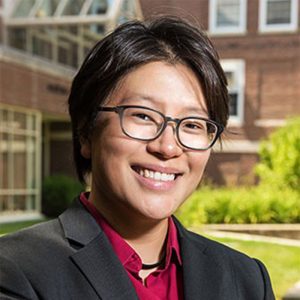Editor’s Note: In this BC Law Magazine “Vision Project” series, we are engaged in a lengthy discussion with Boston College Law School faculty about where the Covid-19 pandemic and its attendant medical, economic, racial, and political consequences may lead us. As New York Times op-ed columnist Timothy Egan so eloquently put it recently, “Every crisis opens a course to the unknown. In an eye-blink, the impossible becomes possible. History in a sprint can mean a dark, lasting turn for the worse, or a new day of enlightened public policy.” There are warnings and worries in these professors’ views, but there are also farsighted ideas and strategies for crafting a better future, a more just society, and a world in which each and every human being is equal under the law.
PROFESSOR SHU-YI OEI
Professor Oei teaches and writes in the areas of tax policy and economic regulation. Her research interests also include social insurance and the relationship between tax administration and economic security, and privacy and transparency in domestic and international tax enforcement and administration.

What has the coronavirus pandemic revealed about the strengths and weaknesses of our tax policies and economic regulations and their ability to respond to this international crisis? My coauthors here at BC and I have been studying and writing about the economic and financial policy responses to the pandemic. One thing that has been striking is the degree to which the initial US legislative response has been shaped by our underlying political backdrop and prior institutional choices. For example, the $1,200 recovery rebates (stimulus checks) provided for in the CARES Act were delivered through the tax system, in part because that’s one of the best information sources we have on individual financial situations. It’s imperfect, but it’s the system we’ve developed.
Another issue is that the US does not have the most robust social safety net system, and many of our social insurance and safety net provisions have been tied to work—for example, health insurance and the earned income tax credit. So somewhat predictably, we have observed legislative resistance to broad-based income support programs and grants as a way to manage the public health crisis.
A significant weakness in the pandemic response so far relates to federal and state policymakers’ failure to sufficiently manage the public health crisis. My sense is that—in part because it is hard to appreciate the seriousness of data presented in abstract numbers, and in part because health and economic impacts have disproportionately been felt in underrepresented communities—the salience of the public health threat is not as high as it could be among broad segments of the public and policymakers. Thus, there has not been a strong enough commitment to tackling the crisis in a serious way. This is certainly an area in which the US can and must do better.
What short- and long-term opportunities do you see arising from the pandemic for improving how we define and deliver economic justice? I think there are a lot of potential risks and pitfalls for the US over the longer term.
One risk is that in terms of the economic dimensions, we are seeing a significant economic reallocation between sectors, as some industries are devastated by the pandemic while others thrive. On the individual level, this could mean a significant employment shock for those working in certain sectors. In terms of businesses, we could see businesses with monopoly characteristics (e.g., Amazon and Google) becoming even more powerful going forward.
Here, there is an opportunity for the US to boost social and economic equity through well-designed social safety net and retraining programs, but the risk is that policy inaction or poorly designed policies could exacerbate emerging shocks and associated inequalities. Historically, the US has not been very good at retraining workers, a limitation which might be particularly problematic now. Also, longstanding political and institutional constraints may lead to less-than-perfect social insurance and safety net design. These challenges need to be successfully navigated in order to achieve fairer economic outcomes.
What is your vision for a post-pandemic world: What policies and plans would you recommend to guide us toward building and sustaining a stronger and more just society? I would like to see more investment in public health, education, and infrastructure, and more commitment to responsible leadership and national preparedness for future pandemics and crises. It is increasingly recognized that the economic and public health burdens of the pandemic are being borne disproportionately by racial and ethnic minority groups, in particular by black and African American and Hispanic/Latino persons. And it is also increasingly recognized that the pandemic is having serious consequences for national and global poverty. Policymakers need to take these impacts seriously and work to alleviate them, for example, by providing a more robust social safety net to help lessen the shocks of unemployment and financial distress and by working to remedy longstanding health care inequities.
Read all faculty Vision Project interviews here.


